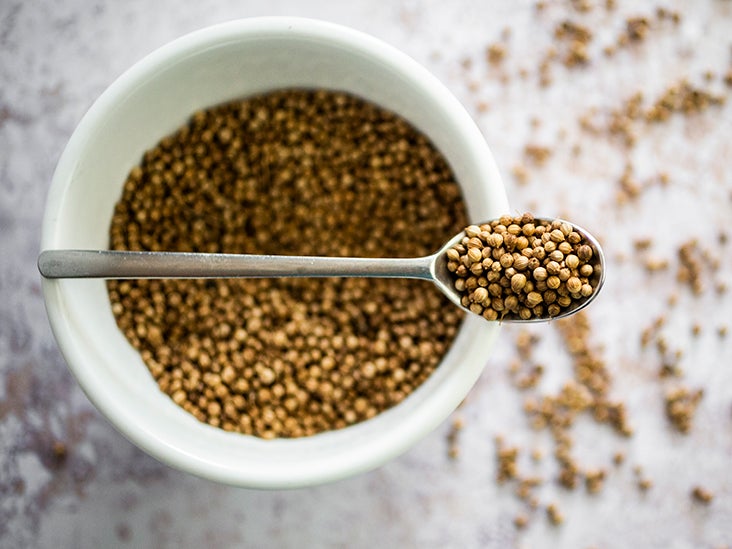
People can use a number of alternatives to substitute the fresh, ground, and seed forms of coriander.
Coriander comes from the plant known as Coriandrum sativum L. It has a strong flavor and smell, and is a favorite for seasoning in recipes. People all over the world use it in their cuisine, from Asia and the Middle East to Latin America.
People use different terminology for the leaves, the powdered or ground form, and the seed of the plant, depending on where the person comes from.
In this article, “coriander” refers to the seeds of the plant, while “cilantro” refers to the plant’s fresh leaves. The article discusses substitutions for the fresh, powdered, and seed forms.
The main reasons for substituting coriander and cilantro are:
- taste
- availability
- an allergy to coriander
Below are 10 substitutes for ground coriander, coriander seeds, and fresh cilantro leaves.
Cilantro and coriander add flavor to food, and they also have many health benefits.
Studies suggest that both forms have antioxidant and antimicrobial advantages.
Despite the many health benefits and range of uses, a person may dislike cilantro or coriander’s pungent smell and taste. Research conducted in 2012 indicates that some people perceive the taste of cilantro as “soapy.” due to genetics.
Coriander and cilantro contain aldehydes. Soap also contains aldehydes.
In some people, the aldehydes in cilantro may activate the OR6A2 olfactory receptor gene, which causes the person to perceive it as having a soapy taste and smell.
Cilantro has a citrus-like flavor and the fresh leaves are easy to add for seasoning.
There are several fresh herbs a person can use to add flavor to dishes if they don’t want to use cilantro, including:
Tarragon
French recipes often include tarragon. The flavors are best when the leaves are bright green.
This herb has a mild taste. Combining it with other herbs such as basil, fennel and garlic enriches flavor. Tarragon works best as a cilantro substitute when used with food such as:
Basil
Basil is from the mint family and is a common herb in Italian cuisine. It forms the main ingredient in pesto and pairs well with garlic, lemon, and tomato.
Southeast Asian dishes, such as Thai curry, often include basil. The taste tends to be sweeter than cilantro.
Thai basil
Thai basil has an anise tone and is preferable when cooking Southeast Asian cuisine.
This herb is a popular substitute in curries and stir-fries.
Parsley
Parsley has similar characteristics to cilantro, but veers toward the bitter side.
Parsley is available in curly and flat-leaf forms. It’s best when chopped finely and blended into soups and casseroles, or added to salads.
Dill
Fresh dill is in season in spring and early summer. However, it is often available in supermarkets throughout the year.
Dill also has an anise tone, but it can turn bitter in hot summer temperatures.
The flavors are strongest when cooked for short bursts of time. This makes it suitable for adding to:
A person can pair lime with cilantro substitutes in curries, dips, and Asian dishes for similar taste combinations.
They can pair garlic with coriander for more European-influenced dishes.
Ground coriander is the powdered or “spice” form of coriander seeds.
The ground form of seeds often has a less intense taste, so it may be worth increasing the amount during cooking to achieve the desired flavor.
Cumin
Cumin and coriander often go together in recipes. Cumin is a popular ingredient in many cuisines around the world. It has a nutty taste, so it is best to add it slowly for the right flavor balance. Pair it with:
Cumin is a flavorsome addition to casseroles, curries, and soups. However, the seeds can be strong. A person can make their own ground cumin by toasting the seeds and then using a pestle and mortar to grind them.
The nutritional value of cumin seeds for 1 teaspoon (tsp) or 2.1 grams (g) is:
- water – 0.169 g
- energy – 7.88 kilocalories (Kcal)
- protein – 0.374 g
Curry powder
Curry powder is a collective term for a spice mix containing dried spices such as ginger, cumin, and turmeric, as well as coriander.
People might prefer a combination of flavors if coriander is too overpowering on its own.
Garam masala
Garam masala is sweeter than curry powder and does not have the same turmeric base tone.
Common ingredients include a blend of:
The collective blend is aromatic and commonly used in northern Indian cuisine.
Caraway
Caraway is similar in taste to coriander and would not be an advisable substitute for people who do not like coriander’s taste.
However, it does make it one of the easiest direct substitutes for coriander.
Its sweet undertone makes it appropriate for sauces, marinades, and one-pot dishes. People can add caraway to dishes in either seed or ground form.
Fennel
Ground fennel has a sweet undertone. It goes well with root vegetables in dishes such as soups, casseroles, and curries.
Fennel is also a common flavor in breads as well as sweet food.
People can use fennel seeds to add flavor and texture to dishes such as roast vegetables. They can also toast the seeds and add them to salads or curries.
Nutritional value of fennel per 1 tsp (2.1 g)
- water – 0.207 g
- energy – 6.99 Kcal
- protein – 0.415 g
People use coriander and cilantro in cuisines all over the world. The intense flavor and taste can divide opinion. Some people may even experience the flavor differently due to their genetic makeup.
However, there are many substitutes for coriander and cilantro that are easy to find and use.
Herbs can replace fresh cilantro and there are suitable spice substitutes for powdered (ground) and seed forms of coriander.
People will use different forms of the herb and spice, depending on what they are cooking.
April 29, 2021 at 04:33PM
https://www.medicalnewstoday.com/articles/coriander-substitute
The 10 best coriander substitutes: Ground, fresh, and seeds - Medical News Today
https://news.google.com/search?q=fresh&hl=en-US&gl=US&ceid=US:en

No comments:
Post a Comment